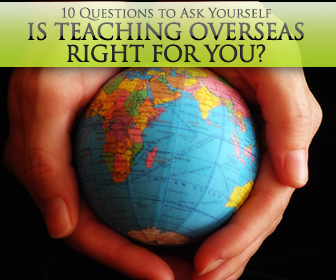Are You Ready to Teach Overseas? 6 Locations You Should Consider


I know from my own time in East Asia, no matter how well you prepare you are never quite ready for the challenges moving across the world presents. For some, teaching overseas is a good experience. For others, it’s quite the opposite. If you are wondering if teaching overseas is right for you, here are ten questions to ask yourself before you get your ticket to adventure.

If nothing else, teaching English in a foreign country is an adventure. If you are considering moving to another country to share your knowledge of the English language, you probably have that spirit of adventure. If you’re not the adventure type, you may want to think twice before leaving everything familiar behind.
Along with your spirit of adventure, ESL teachers who find success overseas have to be flexible. So often, things are not as they appeared. In my case, I took a job teaching ESL to middle school and high school ESL students. As it turned out, my class was actually composed of second and third graders. Chalk it up to miscommunication, but this is just one of many situations that demanded flexibility on my part, and likely you’ll have your own flexibility challenges if you do go overseas.
Don’t be fooled by the myth that all overseas teaching jobs come with great pay. Though some do, many do not. When you read advertisements for ESL positions, make sure you convert the given salary to U.S. dollars or whatever monetary system you are familiar with. Think about your living expenses overseas. Will the school provide an apartment? Transportation? Board? How much does it cost to live where you are thinking of going? Will you have to purchase your own plane ticket? Also, think about expenses that will continue back home. If you have student loans, for example, you may need to keep them current even when you are teaching in another country. Plan ahead and don’t put yourself in a stressful financial position.
Look carefully at the time commitment your potential employer is asking for. Will you have to sign a two year contract? A five year contract? Is the job just for a few months or weeks? Will you be able to come home for any length of time during your contract? Once you answer these questions, ask yourself if you can realistically stay overseas for that length of time without putting stress on yourself financially, socially or emotionally.
If you are travelling overseas to teach English, you are most likely going to have to learn some language of your own. Do you already know the native language of the country you will be in? Can you learn the language before you go? Can you learn the language while you are there? These are questions that only you can answer. Keep in mind, too, that not being able to communicate with people in the community is a humbling experience. Can you handle the repercussions of being a foreigner? If you’re not sure, think twice before you agree to any overseas teaching.
Some overseas teaching experiences have a built in community aspect. When I taught overseas, I took a position at an international school where most of the other teachers were from the U.S. The school provided my apartment complete with roommates who also taught at the school. We became friends, and they were a great support for me at difficult moments. Not every overseas teaching opportunity is like that, however. Many who teach ESL overseas will find themselves where no other English speakers are to be found. In such cases, it’s important to think about how you will keep in contact with family and friends back home and what type of support they will be able to give you, either over the phone or via electronic means.
This seems like an insignificant question, but it’s still something you need to consider before going overseas to teach. In fact, you won’t be going anywhere if you don’t have permission to leave your country and enter another. Once you have your passport, you’ll need to look into getting the proper visa and other documentation in addition to medical tests and vaccinations. Hopefully your potential employer can help you with these things, but if you are going to be the sole English teacher at a foreign school you may be on your own when it comes to getting your paperwork in order.
Why are you considering teaching overseas in the first place? Is it a career move? For personal enrichment? Both are valid reasons to take the plunge, but be honest with yourself at the start. If you are going for personal reasons, how will this experience help or hurt you in the future? If you are going to further your career, will there be any negative effects from leaving your current position for a year or more? Are you willing to stay overseas long term if the opportunity presents itself? Know your answers and your expectations before you pack your suitcase.
Of course, you’ll need to be comfortable with teaching English, but have you done your research on the school? What kind of reputation does it have? What do other teachers have to say about it? If possible, get in touch with someone else who has gone overseas to teach at your school and ask them as many questions as you can. You may want to ask about where you might be going, the school, the people, the students and the country.
Are you married? Do you have children? Who else will be affected by your decision to travel overseas? Taking an honest look at how the ones you love will be affected by your decision is important. Especially if you will be bringing those loved ones with you on your adventure, are they ready, too? Have an honest conversation with these people sharing your hopes and fears and letting them share theirs.
It was also one of the most difficult. Is teaching overseas right for you? Are you ready for it? Only you can answer that question, but whatever your decision, be confident that it is the right one.